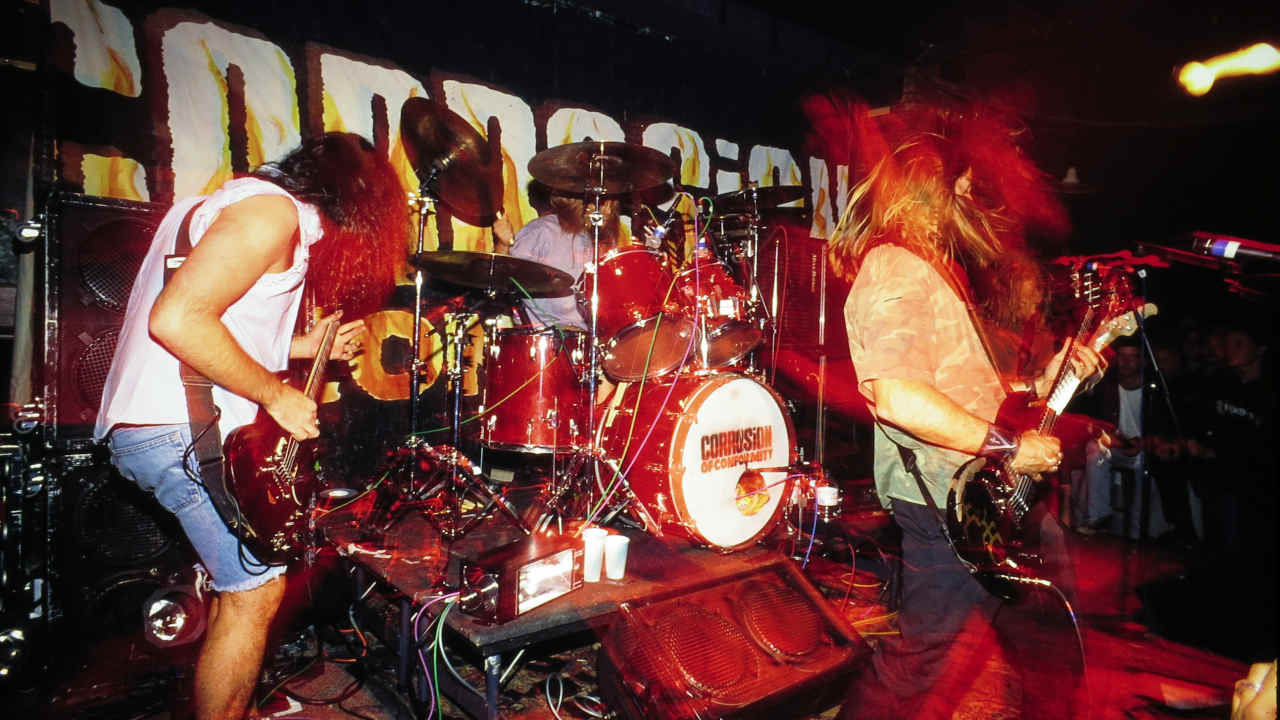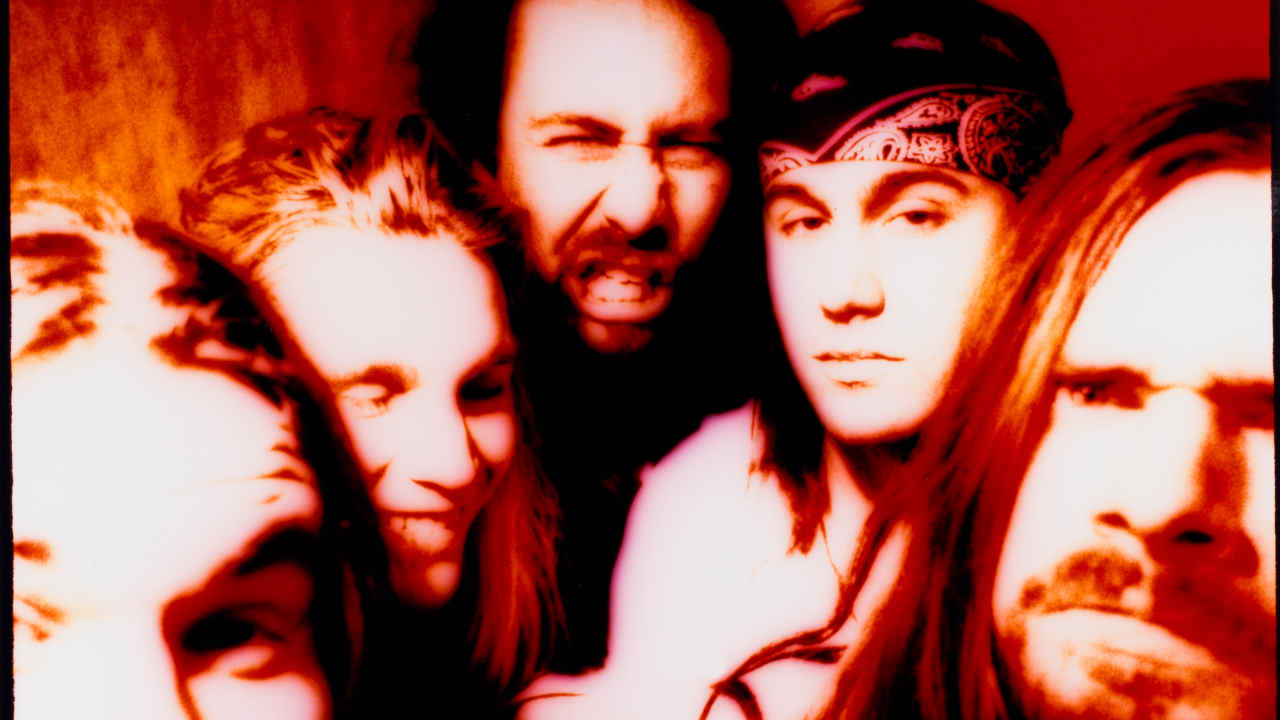
If you were a fan of Corrosion Of Conformity in the 1980s, chances are you knew them as hardcore punk hellions, their first two records howling to life in a flurry of rapid beats and furious riffs that blurred the lines between 80s hardcore and thrash. By the time the 90s rolled around, however, the band were primed to be the leaders of America’s sludge-flecked stoner metal scene. Talk about a change of pace.
“COC was expanding at that time – we’d hit a point where we were basically preaching to the converted, so it wasn’t as exciting as it had been,” admits Corrosion Of Conformity frontman Pepper Keenan, who joined the band as a guitarist in 1989, just as they were about to shift gears. “We were punk rock kids listening to things that were broadening our horizons. We’d always loved Sabbath, but now we could play that shit!”
Prior to joining Corrosion Of Conformity, Pepper was the guitarist in New Orleans band Graveyard Rodeo. Although already familiar with the members of COC by the end of the 80s, there was an 850-mile gulf between his home state of New Orleans and COC in North Carolina. But when a mutual friend of Pepper and COC drummer Reed Mullin told him the band were auditioning singers, he made the journey without hesitation.
At that point, COC were already looking to branch out stylistically, Reed even tentatively reaching out to Chris Cornell and Buzz Osborne of Melvins. Pepper was decidedly different to their hardcore punk roots, but he still didn’t quite fit the bill for what the band wanted. Thankfully, it wasn’t a wasted journey; he was invited to join as a second guitarist, even sleeping in their jam room. He got a job working out of a skate shop and, when he wasn’t there, he was writing music and playing with his new bandmates.
“Me, Reed and Woody [Weatherman, guitar] would play for days ferociously,” Pepper says. “We got most of the music for [1991 album] Blind written and ready before we’d even got the record deal. By the time we got Karl [Agell, vocals] in the band, it was all pretty much done.”

With Karl and Pepper in the band, the now five-piece COC wasted no time when it came to getting on the road. But while some audiences embraced the band’s new, Southern-tinged direction, others were less convinced.
“People losing their minds over our new sound was the best part of touring [during the Blind era],” Pepper says, pointing to shows supporting hardcore legends Bad Brains as a particular highlight. “The Bad Brains crowd really got it straight away, but you’d get to play with some of these other bands and you couldn’t step out the circle for a second without them getting pissed. In Germany, some guy came up and demanded to know why COC had abandoned its hardcore roots – I just thought, ‘That’s a funny question…’ because we were still dirtbag punks!”
As the 90s rolled in, Corrosion Of Conformity were invited on tour alongside Danzig and grunge icons-in-the-making Soundgarden. It opened a world of new possibilities for them.
“Danzig was very supportive of what we were doing,” Pepper says. “From that, we became friends with Soundgarden and went out to Europe with them. It made us realise we were on the right track; we weren’t just playing these dodgy little hardcore venues, we were pushing on and really making our name. It was an incredibly creative time and we knew we needed to be part of it.”
But, just as band life was getting really exciting, disaster struck when things went wrong for Pepper during a stagedive at a show.
“I broke my femur and pelvis about two weeks before we went into the studio,” he says. “I did the entire record in a wheelchair; it was brutally painful.”
Still, the band persevered and worked painstakingly on Blind, ensuring every little detail was perfect (“It was a pretty cheap studio, but we blew all our money until it sounded right,” says Pepper). One song in particular, however, required more tinkering to get over the line.
“I wrote a bunch of material for that album, but there was one song that had a different vibe to it,” Pepper says. “We were tripping out on Ministry’s [1989 album] The Mind Is A Terrible Thing To Taste, this thing that was so angry and aggressive, and I got this idea, so the guys said, ‘Roll with it.’”

The song, Vote With A Bullet, was a furious rampage of stomping riffs and disenfranchised lyrics that combined the politicism of hardcore with the all-out muscular prowess of heavy metal. Pepper didn’t have to dig too deep to find lyrical inspiration either.
“I was pissed at the world,” he admits. “My body was broken and I owed all this money to hospitals – hundreds of thousands of dollars when I was basically sleeping on somebody’s dining room table in a sleeping bag. It’s a battle cry for the disenfranchised youth who were sick of the system. The man in the ivory tower wasn’t working for us.”
Although Pepper hadn’t made the cut to become COC’s vocalist, he finally got his chance to show off his lead vocal talents on Vote With A Bullet.
“Karl’s voice was great, but it wasn’t what Vote With A Bullet needed,” Pepper says. “It was a different animal to the other songs, it had this almost industrial feel to it. I put myself forward, like, ‘I’ll sing it’, because I knew the words and had the mental ammunition from the broken femur, wanting to let all that energy off. It was just an idea to run the vocals through a distortion pedal; it wasn’t like there were vocal effects at that point, and we didn’t have a clue anyway, so we just tried different things out.”
Released on November 5, 1991, Blind arrived to a world that had just fallen under the spell of Seattle and the alt revolution. The timing could hardly have been more perfect; Blind’s mix of Sabbath low-end, chugging Metallica-style riffs and grunge-adjacent sludge heralded a new era for the group, taking them from cult status in the underground to genuine contenders when they peaked at No.24 on the US Billboard Heatseekers chart, propelled in no small part by the significant airplay for singles such as Dance Of The Dead and Vote With A Bullet.
It wasn’t long before the band were again offered out on tour, this time supporting heavy metal giants such as Metallica and Iron Maiden.
“Imagine how surprised we were when Iron Maiden wanted to take us on tour!” Pepper gushes. “One time I got to work Eddie’s hands, with the remote control and ropes – I made him do the metal horns. I could hear the crowd over the band’s backline when we did that! The hands were just supposed to wiggle! Ha ha ha!”
But though the band were breaking into the mainstream in ways they couldn’t have even dreamed of in their early hardcore days – Dance Of The Dead even reaching millions of people thanks to its appearance on Beavis And Butt-Head – there was trouble in paradise. Both Karl and bassist Phil Swisher quit the band in 1993 as they were about to record their fourth album. Freshly signed to Columbia Records, the band could scarcely afford for things to go off the rails – especially considering how intensely Columbia had pursued them.
“We were on this tiny label, but Colombia heard the demos and basically bought the record company to get our contract because the label wouldn’t sell us,” Pepper says. “They bought it and turned it into a fuckin’ distribution company – that was some fucked-up shit!”
As luck would have it, the band’s original bassist, Mike Dean, returned to the US around the same time and was soon drafted back into the group – and he immediately saw an easy fix for their singer problem.
“We did try some other guys out, but Mike just goes, ‘Dude, you sang Vote With A Bullet, you need to do this’,” Pepper recalls. “Suddenly I’m writing all these lyrics again and I think the first song we did was My Grain, followed by Albatross. After that, everything fell together.”
With Pepper now on vocals, 1994’s Deliverance officially saw COC cross over into the mainstream, entering the Billboard 200 chart and peaking at No.5 in the Heatseekers chart. From there, they were quickly established as leaders of the nascent US stoner metal scene alongside the likes of Kyuss and Sleep – all linking back to one song they recorded in 1991 that changed their direction completely.
“Vote With A Bullet was the fuse for what COC would become,” Pepper admits. “I just think the idiotic simplicity of it is perfect; as soon as I play that riff, I don’t even need to say what the song is – and I never do! – people just lose their minds.”







